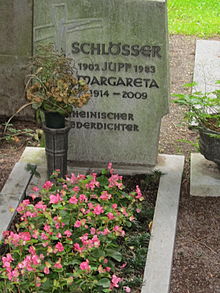Jupp locks
Jupp Schlösser (born July 26, 1902 in Cologne ; † February 23, 1983 there ) was a German singer and songwriter who specialized in Cologne carnival hits . Some of his High German mood songs also gained supraregional importance.
Life
Initially, Schlösser worked as a baker and tram driver before he became a buffoon poet. He was looking for a composer who could add common melodies to his text ideas. When he met Gerhard Jussenhoven through Karl Berbuer in 1938 , he made songwriting his main occupation. Based on the model of the solo lied performance , for which Willi Ostermann was the key figure, many classics of the Cologne Carnival were created, some of which were also successful nationally as mood songs. Schlösser wrote many of his songs together with Jussenhoven or Jupp Schmitz .
They both created more than 50 songs in Cologne dialect, including such well-known ones as Die Hüsjer bunt om Aldermaat (their first big success from 1938, in which the backdrop of the town houses on the Alter Markt with their medieval pointed gables is sung about ), Die hinger de Jadinge ston un spinxe (1939; about informers during the Nazi era; with the Will Glahé orchestra ), Dat Glockespill vum Rothuusturm about the glockenspiel at the town hall , Sag 'ens Blotwoosch (as a musical language test for non-Cologne “ Imis ”), D'r Molli (a critical one Depiction of the time between the two world wars) and the song Do not look at the clock (1952), which the prince leader did not like to hear . High German songs like Kornblumenblau (recorded on October 25, 1937) were also created, which have been sold 12 million times to date. The Schunkelwalzer, originally sung by Willy Schneider , was used in the German film of the same name, which was released on December 15, 1939.
Awards
- Jupp Schlösser is the recipient of the Willi Ostermann Medal.
- According to Karl Berbuer in 1967, the Kölner Rote Funken honored him as a scabies singer with 20 works in their Leederheff för de Fastelovenszick 1967 .
Selection of works
- Cornflower Blue / You Can't Know That (October 25, 1937)
- The Hüsjer bunt om Aldermaat , 1938
- Pay attention to the vintage , 1938
- There is no place on earth (cornflower blue) , 1939
- Singing Cologne, piano, 12 dance hits , 1939
- The Hinger De Gadinge Stonn und Spinxe , 1939
- Sag ens Blotwoosch / Always new songs , 1948
- The old date tree , December 1948
- Think like Goldschmeedsjung / On the Mississippi , October 26, 1949
- D'r Molli , 1950
- (These are) The Dangerous Years , 1950
- Robber barons / Already us ancestors, the Germans ... , 1951
- You are the woman the doctor prescribed for me / robber barons robbed the Rheine , 1951
- Don't look at the clock / Met 2 per mill em blot , 1952
- Dat Glockespill vum Rothuusturm , 1954
- But in the evening / Et Bügelleed , 1955
- Where the torrent rushes , 1956
- Nobody takes anything with them (Willy Schneider), 1968
- I can't miss your love / Dat ha'mer gän
- Hoppe Hoppe Reiter
Web links
- Gerhard Jussenhoven is celebrating his 90th birthday at the Kölsch Academy
- Sound carriers and compositions by Jupp Schlösser in the catalog of the German National Library
Individual evidence
- ↑ Gerhard Jussenhoven is celebrating a 90th birthday ( memento of the original from March 26, 2009 in the Internet Archive ) Info: The archive link was automatically inserted and not yet checked. Please check the original and archive link according to the instructions and then remove this notice. Kölsch Academy
| personal data | |
|---|---|
| SURNAME | Schlösser, Jupp |
| BRIEF DESCRIPTION | German singer and songwriter |
| DATE OF BIRTH | July 26, 1902 |
| PLACE OF BIRTH | Cologne |
| DATE OF DEATH | February 23, 1983 |
| Place of death | Cologne |

